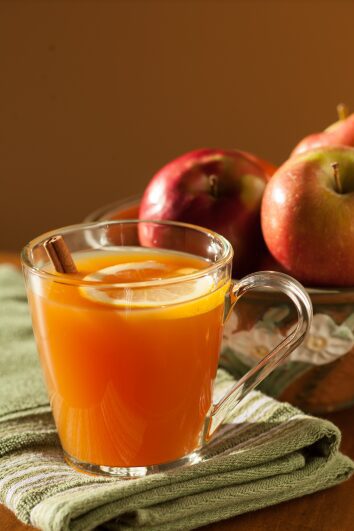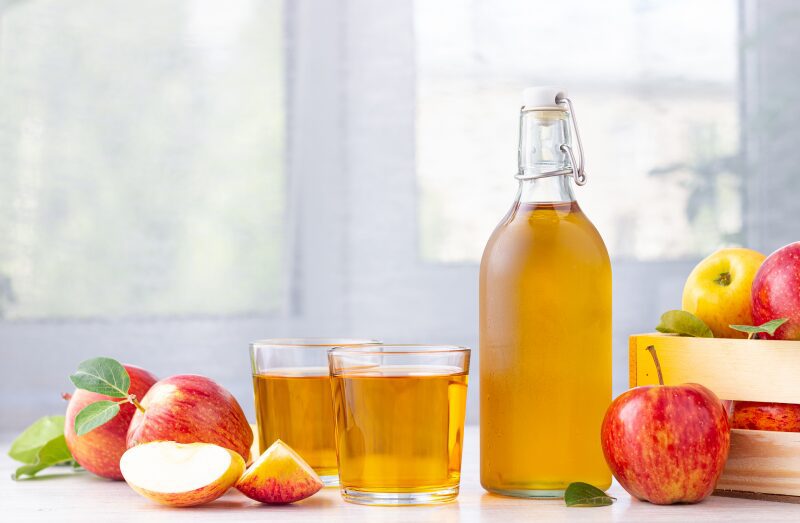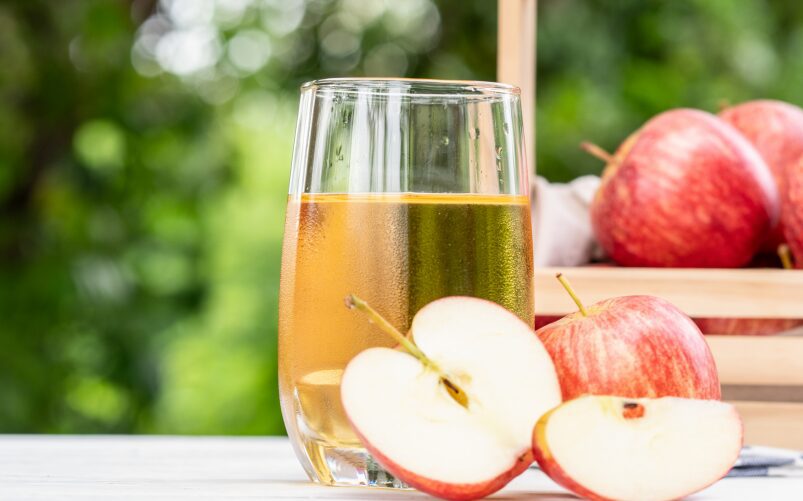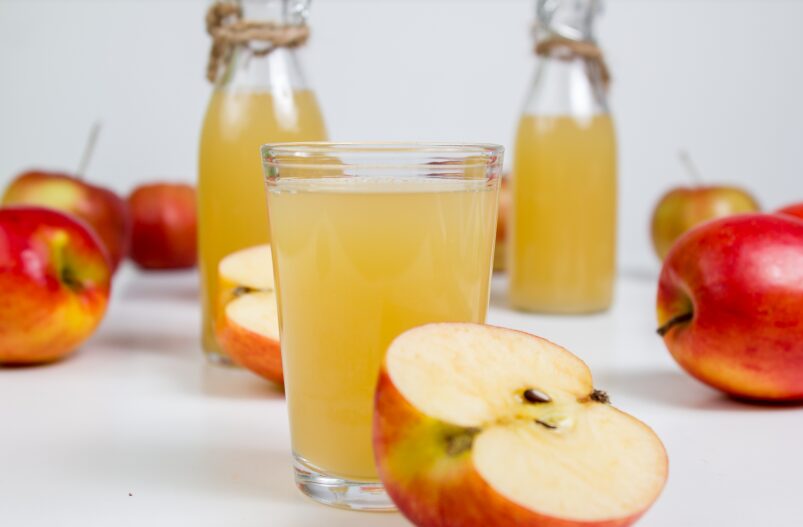Apple is one of the most widely cultivated and consumed fruits in the world, known for its sweet and tart taste, crisp texture, and nutritional value. Apples come in a variety of colors, ranging from shades of green, yellow, and red, and they can be eaten raw, cooked, or processed into various food products such as juice, cider, and sauce.
Apples are rich in fiber, vitamins, antioxidants, and other beneficial compounds that may promote overall health and well-being when consumed as part of a balanced diet.
In this article, we’ll cover thorough information about the difference between Apple Cider and Apple Juice.
What Is Apple Cider?

Apple cider is a beverage made from freshly pressed apples. The process involves crushing apples and then extracting the juice, which is then fermented with the help of yeast to turn the sugar in the juice into alcohol. The resulting cider can be consumed as is or further processed through pasteurization, filtration, or other methods to improve its flavor and shelf life.
In some regions, the term “apple cider” specifically refers to unfiltered apple juice, while in other places it may refer to alcoholic cider. Apple cider is often enjoyed during the fall season in countries like the United States and Canada, and it can be served either hot or cold.
What Is Apple Juice?

Apple juice is a type of fruit juice made from the liquid extracted from apples. The juice is usually produced by pressing the apples, which extract the juice from the fruit. The resulting juice is then filtered and pasteurized to ensure freshness and safety.
Apple juice can be consumed on its own or used as an ingredient in cooking and baking. It is a popular beverage around the world and is often considered a healthy option due to its natural vitamins and minerals.
The Difference Between Apple Cider and Apple Juice
The main difference between apple cider and apple juice is the way they are processed. Apple cider is made by crushing apples and pressing the juice out of them. The resulting juice contains pulp and sediment from the apples, giving them a cloudy appearance and a slightly tart flavor. Apple cider is typically unfiltered and may be pasteurized or unpasteurized.
On the other hand, apple juice is made by filtering the pulp and sediment from the apple juice, resulting in a clear liquid with a sweeter taste. The juice is then usually pasteurized to extend its shelf life.
In short, apple cider is less processed and has a slightly tangy taste and cloudy appearance, while apple juice is filtered to remove pulp and sediment, resulting in a sweeter taste and clear appearance.
Apple Cider Health Benefits
Apple cider is a type of vinegar made from fermented apple juice. It has been used for centuries as a natural remedy for a variety of health conditions. Some potential health benefits of apple cider include:
Lowering Blood Sugar Levels
Apple cider may help improve insulin sensitivity and lower blood sugar levels, especially after meals. This can be beneficial for people with diabetes or those at risk of developing it.
Improving Heart Health
Studies suggest that apple cider may help lower cholesterol levels and improve heart health by reducing triglycerides and blood pressure.
Aiding in Weight Loss
Some research suggests that apple cider may help with weight loss by reducing appetite and promoting feelings of fullness.
Boosting Digestive Health
Apple cider vinegar may help improve digestion by increasing stomach acid production, which can help with the breakdown of food and the absorption of nutrients.
Fighting Infections
Apple cider vinegar has antimicrobial properties and may help kill harmful bacteria and viruses.
Supporting Healthy Skin
Apple cider vinegar may help improve skin health by reducing acne, improving skin hydration, and reducing the appearance of age spots.
It’s important to note that more research is needed to fully understand the health benefits of apple cider and to determine the best ways to use it for optimal health. Additionally, it’s important to talk to your healthcare provider before starting any new supplement or making changes to your diet.
Read More: What to Do With Leftover Apple Cider? (Quick Ideas)
Apple Juice Health Benefits
Apple juice has several potential health benefits, including:
Nutrient-Rich
Apple juice is a good source of vitamins, particularly vitamin C, which can help boost the immune system, and potassium, which can help regulate blood pressure.
Digestive Health
Apple juice contains soluble fiber, which can help promote digestive health by keeping the digestive system moving smoothly.
Hydration
Apple juice is a good source of hydration, which can help keep the body functioning properly.
Antioxidants
Apples are high in antioxidants, which can help protect the body against oxidative stress and damage caused by free radicals.
Heart Health
Drinking apple juice may help lower cholesterol levels and reduce the risk of heart disease.
Cognitive Function
Some studies suggest that drinking apple juice may improve cognitive function and memory.
Keep in mind that apple juice should be consumed in moderation as it is high in sugar and calories. Additionally, it’s best to choose apple juice that is 100% pure and free from added sugars or artificial sweeteners.
How to Store Apple Cider and Apple Juice

Storing apple juice and apple cider properly can help preserve their quality and freshness. Here are some tips on how to store them:
Refrigerate: Both apple juice and apple cider should be stored in the refrigerator to keep them fresh. Once opened, they should be consumed within 7-10 days.
Freeze: If you have an excess amount of apple juice or cider, you can freeze them in airtight containers or freezer bags. Be sure to leave some room at the top of the container or bag for expansion. Frozen apple juice and cider can last up to 8 months.
Store unopened containers properly: Unopened containers of apple juice and cider can be stored in a cool, dry place away from direct sunlight. Check the expiration date on the package and consume before it expires.
Avoid exposure to air: Oxygen can cause the quality of apple juice and cider to deteriorate, so it is best to keep them in airtight containers.
Check for signs of spoilage: If you notice any changes in color, taste, or smell, discard the beverage. Also, check for bulging or leaking containers as these may indicate spoilage or contamination.
How to Use Apple Cider and Apple Juice
Apple juice and apple cider are both delicious beverages that can be used in a variety of ways. Here are some ideas:
Drink it straight: Apple juice and apple cider are both delicious to drink straight out of the bottle.
Make cocktails: Use apple juice or apple cider as a base for cocktails. For example, mix apple cider with whiskey for a delicious fall-themed drink.
Add it to smoothies: Apple juice or apple cider can be a great addition to smoothies, adding a sweet and fruity flavor.
Use it in baking: Apple juice or apple cider can be used in baking to add flavor and moisture to cakes, muffins, and bread.
Make apple cider vinegar: If you have apple cider, you can make apple cider vinegar by fermenting it. Simply let the cider sit in a cool, dark place with a bit of vinegar “mother” or some unpasteurized vinegar, covered with a cloth, for several weeks until it turns to vinegar.
Make apple butter: Use apple cider to make apple butter, a delicious spread that can be used on toast, biscuits, and more.
Cook with it: Apple juice or apple cider can be used in savory recipes, such as braised pork or roasted vegetables, to add sweetness and flavor.
Freeze it: Freeze apple juice or apple cider into ice cubes and use them to chill drinks without diluting them.
Apple Cider vs Apple Juice: Which Is Better For You?
Both apple cider and apple juice are made from apples, but they are processed differently and have some differences in terms of nutrition.
Apple cider is made from fresh apples that are pressed and crushed to extract the juice. It is then left to ferment, which gives it a slightly tangy and acidic taste. Apple cider is often unfiltered, which means it still contains some pulp and sediment from the apples.
Apple juice, on the other hand, is made from apples that are also pressed and crushed, but the juice is then filtered to remove any pulp or sediment. It is usually pasteurized to kill any bacteria and extend its shelf life. The resulting juice is sweet and refreshing, with a consistent flavor and texture.
In terms of nutrition, both apple cider and apple juice are good sources of vitamin C and antioxidants. However, apple cider may have slightly more nutrients because it is made from the whole apple, including the skin and pulp. It also contains some probiotics from the fermentation process, which can be beneficial for gut health.
Contrarily, apple juice is often fortified with additional vitamins and minerals, such as calcium and vitamin D, which may make it a better choice for those who are looking to boost their nutrient intake.
In conclusion, whether apple cider or apple juice is better for you depends on your personal preferences and dietary needs. If you prefer a tangy, slightly acidic flavor and don’t mind a bit of sediment, apple cider may be a good choice. If you prefer a sweeter, more consistent flavor and want the added nutrients from fortification, apple juice may be a better option.

